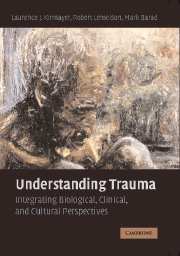Book contents
- Frontmatter
- Contents
- List of Figures
- List of Tables
- List of Contributors
- Foreword by Robert Jay Lifton
- Preface
- List of Abbreviations
- Introduction: Inscribing Trauma in Culture, Brain, and Body
- SECTION I NEUROBIOLOGICAL PERSPECTIVES ON TRAUMA
- 1 Neurobiological and Neuroethological Perspectives on Fear and Anxiety
- 2 Some Biobehavioral Insights into Persistent Effects of Emotional Trauma
- 3 Learning Not to Fear: A Neural Systems Approach
- 4 Mechanisms of Fear Extinction: Toward Improved Treatment for Anxiety
- 5 Developmental Origins of Neurobiological Vulnerability for PTSD
- 6 Does Stress Damage the Brain?
- 7 Somatic Manifestations of Traumatic Stress
- SECTION II CLINICAL PERSPECTIVES ON TRAUMA
- SECTION III CULTURAL PERSPECTIVES ON TRAUMA
- Epilogue: Trauma and the Vicissitudes of Interdisciplinary Integration
- Glossary
- Index
- References
5 - Developmental Origins of Neurobiological Vulnerability for PTSD
Published online by Cambridge University Press: 27 July 2009
- Frontmatter
- Contents
- List of Figures
- List of Tables
- List of Contributors
- Foreword by Robert Jay Lifton
- Preface
- List of Abbreviations
- Introduction: Inscribing Trauma in Culture, Brain, and Body
- SECTION I NEUROBIOLOGICAL PERSPECTIVES ON TRAUMA
- 1 Neurobiological and Neuroethological Perspectives on Fear and Anxiety
- 2 Some Biobehavioral Insights into Persistent Effects of Emotional Trauma
- 3 Learning Not to Fear: A Neural Systems Approach
- 4 Mechanisms of Fear Extinction: Toward Improved Treatment for Anxiety
- 5 Developmental Origins of Neurobiological Vulnerability for PTSD
- 6 Does Stress Damage the Brain?
- 7 Somatic Manifestations of Traumatic Stress
- SECTION II CLINICAL PERSPECTIVES ON TRAUMA
- SECTION III CULTURAL PERSPECTIVES ON TRAUMA
- Epilogue: Trauma and the Vicissitudes of Interdisciplinary Integration
- Glossary
- Index
- References
Summary
The question of vulnerability lies very much at the heart of research on anxiety disorders, such as PTSD (Yehuda, Schmeidler, Wainberg, Binder-Brynes, & Duvdevani, 1998). Surprisingly, only a minority (∼25–30%) of humans subjected to even such a profound trauma as rape develop PTSD (Ressnick, Kilpatrick, Dansky, Saunders, & Best, 1993), and early family life serves as a highly significant predictor of vulnerability to PTSD following trauma (Udwin, Boyle, Yule, Bolton, & O'Ryan, 2000). Moreover, many cases of PTSD derive from events that might not be considered as necessarily traumatic by the general population (Breslau et al., 1998), a finding that further underscores the importance of vulnerability. Moreover, there is evidence for the familial transmission of vulnerability to PTSD that is related to alterations in parent–offspring interactions. These findings are not surprising because anxiety reduces parental responsiveness to offspring (e.g., Fleming, 1988, 1999). These findings suggest that early life events might alter the development of neural systems that mediate cognitive and emotional responses to trauma, and thus contribute to individual differences in vulnerability to PTSD.
The question can be rendered more precise in light of the remarkable advances in human clinical studies. First, PTSD research suggests that the probability of chronic PTSD following trauma is related to the magnitude of the initial reaction to the event (Shalev, this volume). Hence, factors that influence the development of individual differences in reactivity are likely of considerable relevance.
- Type
- Chapter
- Information
- Understanding TraumaIntegrating Biological, Clinical, and Cultural Perspectives, pp. 98 - 117Publisher: Cambridge University PressPrint publication year: 2007
References
- 1
- Cited by



